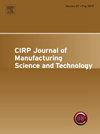Layer-level fabrication of continuous functionally graded materials (cFGMs) via Powder Bed Fusion – Laser Beam technology
IF 4.6
2区 工程技术
Q2 ENGINEERING, MANUFACTURING
CIRP Journal of Manufacturing Science and Technology
Pub Date : 2024-10-19
DOI:10.1016/j.cirpj.2024.10.009
引用次数: 0
Abstract
Multi-material fabrication of metals through Additive Manufacturing (AM) processes is attracting more and more attention in recent years. This work presents a novel methodology that enables the fabrication of continuous functionally graded materials (cFGMs) at the layer level using Powder Bed Fusion – Laser Beam (PBF-LB) technology. This has been achieved by designing and building a customized powder separation system that can be easily installed on a currently operating PBF-LB system with a blade/roller-based powder spreading technique (extremely limited for layer-level multi-material fabrication). This technique overcomes one of the main drawbacks of AM multi-material fabrication by properly joining materials with very different mechanical properties and low compatibility, thus extending the productive capacity of this technology. Two steels, AISI 316 L and 18 Ni Maraging 300, with different physical, chemical and mechanical properties, were used to study the applicability and verify the proposed methodology. A high-resolution optical system was used to monitor, layer by layer, the different laser-matter interactions given by the different materials and thus the presence of a graded transition zone between them. Results in terms of statical mechanical properties, microstructure, chemical analysis and optical monitoring showed that the proposed solution is reliable and cost-effective, paving the way for future applications.
通过粉末床熔融-激光束技术在层级上制造连续功能分级材料 (cFGM)
近年来,通过增材制造(AM)工艺进行金属的多材料制造正吸引着越来越多的关注。本研究提出了一种新方法,可利用粉末床熔融-激光束(PBF-LB)技术在层级上制造连续功能分级材料(cFGMs)。这是通过设计和建造一个定制的粉末分离系统实现的,该系统可轻松安装在当前运行的 PBF-LB 系统上,并采用基于刀片/滚筒的粉末铺展技术(对于层级多材料制造而言极为有限)。该技术克服了 AM 多材料制造的一个主要缺点,即可以将机械性能迥异、兼容性低的材料适当连接起来,从而提高了该技术的生产能力。我们使用了两种具有不同物理、化学和机械性能的钢材(AISI 316 L 和 18 Ni 马氏体 300)来研究拟议方法的适用性并进行验证。使用高分辨率光学系统逐层监测不同材料产生的不同激光-物质相互作用,从而监测它们之间是否存在分级过渡区。在静态机械性能、微观结构、化学分析和光学监测方面的结果表明,所提出的解决方案既可靠又具有成本效益,为今后的应用铺平了道路。
本文章由计算机程序翻译,如有差异,请以英文原文为准。
求助全文
约1分钟内获得全文
求助全文
来源期刊

CIRP Journal of Manufacturing Science and Technology
Engineering-Industrial and Manufacturing Engineering
CiteScore
9.10
自引率
6.20%
发文量
166
审稿时长
63 days
期刊介绍:
The CIRP Journal of Manufacturing Science and Technology (CIRP-JMST) publishes fundamental papers on manufacturing processes, production equipment and automation, product design, manufacturing systems and production organisations up to the level of the production networks, including all the related technical, human and economic factors. Preference is given to contributions describing research results whose feasibility has been demonstrated either in a laboratory or in the industrial praxis. Case studies and review papers on specific issues in manufacturing science and technology are equally encouraged.
 求助内容:
求助内容: 应助结果提醒方式:
应助结果提醒方式:


